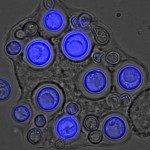Lien vers Pubmed [PMID] – 23927963
Int. J. Med. Microbiol. 2013 Dec;303(8):529-32
The portal of entry of Escherichia coli bacteremia, a frequent and severe disease, is most commonly the urinary tract followed by the digestive tract. Recent reports have evidenced the presence of several distinct E. coli clones within a single patient suffering of extra-intestinal infection. To explore the relationships between the blood and portal of entry strains, we thoroughly studied 98 bacteremic patients from the French prospective COLIBAFI cohort. In these patients, we compared genotypically and phenotypically E. coli strains isolated from the blood and the suspected portal of entry [non-urinary pus (n=52) and urine (n=52)]. We found genetically distinct strains exhibiting distinct antibiotypes in the blood and pus samples (8 patients; 15%) and the blood and urine samples (2 patients; 3.8%) (p=0.09). These data highlight the complexity of pathophysiology of E. coli bacteremia and should be taken into consideration when strain antibiotic susceptibility is tested, especially in bacteremia of pus origin.

